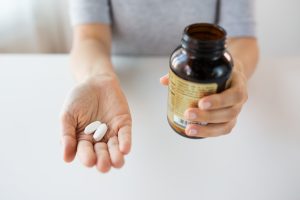Despite the fact that chlamydia is one of the most common sexually transmitted diseases, it is relatively easy to treat, provided you use any of the recommended treatment options available. Chlamydia can last for years without showing any visible symptoms.
This means that chlamydia infections can easily be left untreated for a long time, which can sometimes cause irreversible damage to the body, especially to a woman’s reproductive system. So, how long does chlamydia last? This article will explain how long it takes to heal chlamydia and how long the infection can stay in the body without showing symptoms.
How long does chlamydia last?
With adequate treatment, chlamydia can be cleared entirely within one or two weeks, depending on the recommended treatment option. Chlamydia is caused by the bacterial chlamydia trachomatis.
It is usually passed when fluid is exchanged during sexual activities. This infection, typically common among people aged 25 and under, can be completely cured with antibiotics.
To thoroughly heal chlamydia, you must use your antibiotics precisely as your medical specialist prescribes without skipping a dose. This will ensure that the medication is as effective as it is expected to be.
Antibiotics remedy chlamydia by stopping the growth of the bacteria responsible for the infection and limiting its spread in the body. The CDC recommends using doxycycline or azithromycin to treat chlamydia.
How long does chlamydia last untreated?
Most times, chlamydia can be asymptomatic. This means that it can be present in the body without causing visible symptoms to occur while causing significant damage to a person’s reproductive organs over time.
This is why the CDC recommends that sexually active people get chlamydia tested regularly. Getting chlamydia tested ensures that you can get proper treatment to clear the infection in a couple of weeks.
If left untreated, chlamydia can last in the body for several years to the detriment of the infected person. In addition, untreated chlamydia can cause severe complications like pelvic inflammatory disease, ectopic pregnancy, and infertility.
When and for how long can a person spread chlamydia?
Chlamydia is a sexually transmitted disease that most times doesn’t show visible symptoms. However, the absence of the signs in an infected person doesn’t mean that the infection can’t still be transmitted to other people.
Chlamydia is passed through the exchange of fluid during sexual activities. These activities can include oral, anal, or vaginal sex.
The exchange of body fluids during sexual activities gives the bacteria the chance to pass from one person to another, thereby increasing the prevalence of the infection.
A person can spread chlamydia to others if the infection remains untreated. This is why regular testing is highly advised for sexually active people aged 25 and under.
The asymptomatic nature of chlamydia means that people with the infection can pass it on to their sexual partners without even being aware of the disease.
Suppose you find out you or your partner has chlamydia. Immediately contact your medical expert to be prescribed a suitable treatment option before irreversible damages occur in your body.
Severe abdominal pain is one of the symptoms of a chlamydial infection
Does chlamydia go away on its own?
No, chlamydia doesn’t go away on its own. Chlamydia is a bacterial infection passed through sexual contact with an infected person. This infection can be wholly cured with the right antibiotics. In addition, it’s pretty easy to cure chlamydia once you’ve been diagnosed with a test.
However, the infection doesn’t go away on its own. Instead, chlamydia can remain in the body without causing any symptoms while causing irreversible and potentially fatal damage to the reproductive system.
Sometimes, chlamydia can cause symptoms in the infected person. Still, these symptoms are expected to ease away once the appropriate treatment has been undergone.
When will the signs and symptoms go away?
Some symptoms of chlamydia can include abdominal discomfort, abnormal or smelly vaginal discharge, painful menstruation, Increased urge to frequently urinate, mucous-like discharge from the anus, and increased urge to frequently urinate, among others.
These symptoms, however, will begin to ease in a day or two of starting your recommended chlamydia treatment. The timescale of the symptoms easing can differ from patient to patient.
Still, typically when chlamydia is treated, the symptoms should completely disappear within two weeks.
It’s essential, however, to note that if chlamydia has caused damage to a woman’s reproductive tract, treating the infection will not repair the damage. Instead, antibiotics will only limit the growth and spread of the bacteria responsible for the chlamydial condition, thereby effectively ridding the body of the disease.
Do I need to have a test to know if chlamydia has gone?
Usually, the CDC recommends regular testing for chlamydia, considering how widespread the disease is. If you find out you have chlamydia and follow your doctor’s prescribed treatment religiously, the infection should easily be cured.
However, because recurrent chlamydial infections are common, ensure you get tested at least three months after your treatment. In addition, you should ensure that your sexual partners are appropriately treated, as failure to do so puts you at a heightened risk of getting re-infected.
How long after treatment can I have sex again?
Suppose you’re taking medications for the treatment of chlamydia. You should stay away from sex within this period. However, you can typically start having sex after completing your treatment.
For example, suppose you’re treating your chlamydia with doxycycline. Make sure to stay away from sex until you and your sexual partners have completed your treatment.
Alternatively, if you’re using azithromycin, it will be best to wait for seven days after finishing your treatment to start having sex.
Frequently Asked Questions (FAQs)
We answer some of the most asked questions on “how long does chlamydia last?” below.
Can chlamydia spread through sex toys? Chlamydia can be passed through sex toys because the bacteria from an infected person can get into your body through your anus, vagina, mouth, or eyes during sex.
According to research published in The Journal of Sexually Transmitted Infections which tested sex toys used by women with STDs, some bacteria remained on the toys even after they were washed. However, 24 hours after usage, the number of present bacteria dropped significantly.
Therefore, suppose you suspect your sex toy may have come in contact with infected fluid, you should wait for at least 24 hours, even after a wash, to use it. This keeps you on the safe side.
Chlamydia symptoms typically occur within one to three weeks of infection and are usually very mild. However, if left untreated after the incubation period, chlamydia can remain in the body for several years, causing damage to the reproductive system.
Chlamydia can spread to the fallopian tubes or uterus, causing PID.
Suppose you followed your doctor’s instructions to treat a chlamydial infection. The associated symptoms should go away entirely after your treatment.
However, you can still get infected again even after treatment. If you’re re-infected, you may experience symptoms of the infection again.
To avoid recurrent chlamydia, make sure your sexual partners are adequately treated. In addition, ensure to get retested within 3-12 months after treatment.
View the chlamydia fact sheet here for more information.





